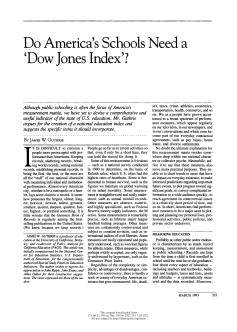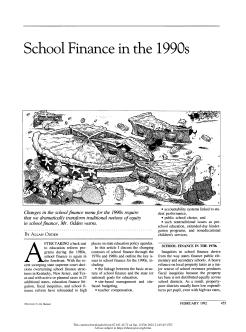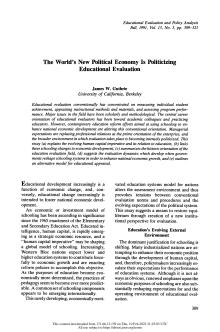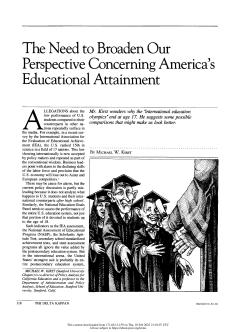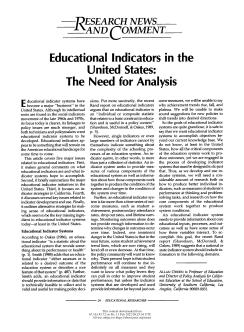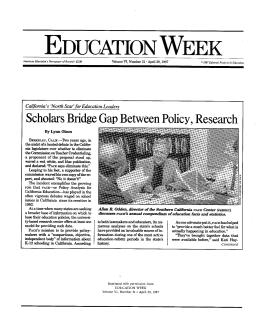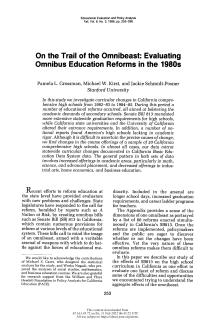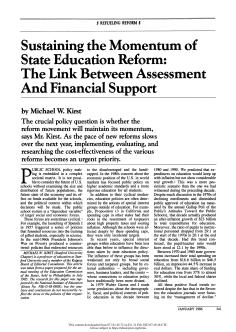Published
Summary
The article discusses the importance of parent involvement in education and its effects on student achievement. It suggests that schools need to create a welcoming environment for parents and engage them in meaningful ways, such as through volunteering and decision-making committees. Additionally, the article emphasizes the need for schools to provide information and resources to parents, especially those who are disadvantaged, to ensure that they are equipped to support their children's learning at home.
Published
Summary
School finance has become a prominent issue again due to court decisions and litigation in several states. This article explores school finance changes in the 70s and 80s and outlines key issues for the 90s, including the relationship between finance and education goals, site-based management, teacher pay, accountability, school choice, and nontraditional issues such as preschool and non-educational services for children.
Published
Summary
Traditionally, educational evaluation has focused on measuring student achievement and program performance. However, education reforms are now linking schooling to economic development, leading to a shift towards managerial expectations and politicization of the field. This article explains the human capital imperative and its relation to education, summarizes the history of educational evaluation, and outlines an alternative model for educational appraisal in the context of government-led education system reforms aimed at enhancing national economic growth.
Published
Summary
The U.S. ranks low in international education comparisons, but the discussion is misleading because it does not look at postsecondary education. The value added by the postsecondary education system, including community colleges, trade schools, and universities, is ignored. The U.S.'s strongest suit is probably its entire postsecondary education system in the international arena.
The Need for Analysis
Published
Summary
Educational indicator systems are in demand in the US due to their strong linkages to policy issues. This article covers five major issues related to educational indicators, including what they are, major initiatives in the US, and indicator strategies in California. It also discusses key issues related to indicator development and use and outlines alternative strategies for making sense of educational indicators, which are currently missing in the US.
An Exploration of the Debate on School District Size
Published
Summary
The notion that larger school districts are superior has changed, with some researchers advocating for smaller ones. Recent reform reports have focused on the school site as the decision-making seat. Three main issues guide district size research: fiscal efficiency, school effectiveness, and community identity. Although research has been conducted, there is still no definitive answer. This article explores the research and debate on the "right" size for school districts and identifies unanswered questions, hoping to kindle interest in further research.
Published
Summary
PACE, a university-based research center, provides "nonpartisan, objective, independent" information on K-12 schooling in CA. Its analyses have been invaluable to lawmakers and educators during the state's active education-reform period. PACE has played a growing role in debates on school issues, exemplified by a heated debate in the CA legislature over the Commission on Teacher Credentialing. PACE offers a model for providing data for education policies when many states are seeking broader information bases. It has helped provide a better understanding of what is happening in education.
Evaluating Omnibus Education Reforms in the 1980s
Published
Summary
The study examines curricular changes in California's high schools from 1982 to 1985, a period of educational reforms aimed at increasing academic rigor. The state mandated more extensive graduation requirements while universities adjusted their entrance requirements. A sample of 20 comprehensive high schools shows increased academic offerings in math, science, and advanced placement, and decreased offerings in industrial arts, home economics, and business education, reflect statewide trends.
The Link Between Assessment and Financial Support
Published
Summary
Public school policy making is embedded in a complex societal matrix. It is not possible to consider the future of U.S. schools without examining the size and distribution of future populations; the future state of the economy and its effect on funds available for the schools; and the political context within which decisions will be made. The public school system is a "dependent variable" of larger social and economic forces.
